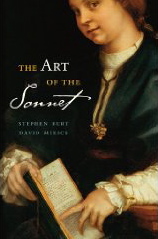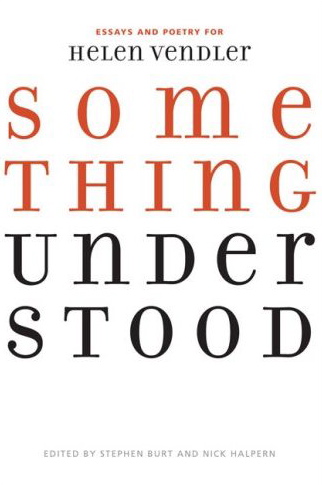Every so often I find in the library, receive in the mail, or acquire, through the exchange of legal tender, books I very much want to recommend, and yet likely won’t have the time, nor the venue, to review properly (either that or the books are just too old for review). One such book is the new lit-crit study by the British poet and scholar Angela Leighton, called On Form. It’s one of the only recent books about form-in-general, poetry-in-general, and the history of ideas about poetic form in general that made me want to run towards, not away from its author: Leighton suggests, sympathetically and plausibly, that “form” has the hidden double “nothing,” itself a double (as you might expect) for “death”: that the fluidity of life (the opposite of nothing, the opposite of death) makes the idea of a wholly fixed poetic form something of an oxymoron; that Walter Pater understood all this; that we can trace specifically Paterian ideas about form, flux and “nothing” from the mid-Victorians all the way up to contemporary British poetry, with a useful stopover in the auroral America of Wallace Stevens; and that, once we have done that sort of tracing, we can place reductive, hostile ideas about the history of “form” (the sort of ideas many grad students think they’ve discovered) in the dustbin where they belong. I am making a vivid sketch of Leighton’s implications, rather than writing a proper book review and saying what she proves, because I’m not a Victorianist, really, and this is a blog, not a peer-reviewed quarterly: but really what I’m saying is, if you’re at all a lit-crit academic, I hope you will read her book.
Something else I really liked but probably won’t review: Franck Andre Jamme’s New Exercises, a book of brief shaped poems– all in caps, in shapes like the letters engraved on tombstones, with no spaces between the words– that sound good even in translation from the French. I knew that some folks believe lyric poetry evolved out of inscriptions on ancient tombs, but I never had an intuitive understanding of the sources for their beliefs until I read what Jamme has done: it sounds good even in translation (by Charles Borkhuis) from the French. You can see a typical, if more-than-typically laconic, Jamme-Borkhuis work here.
Two more recommendations, both graphic novels, both discovered in Ann Arbor, thanks to the dual agency– they are an irresistibly convincing combination– of Rebecca Porte and Ray McDaniel: first, the bittersweet, achy streamlined-realist teen-sadness chronicle SKIM, which is a lot less sexy– and a lot sadder, and at least a bit more profound– than the few reviews I’ve seen implied; second, the latest collection of Astro City installments. If I had ever possessed the ability to make technically sophisticated, long-form comics, Astro City is what I hope I would have made.








